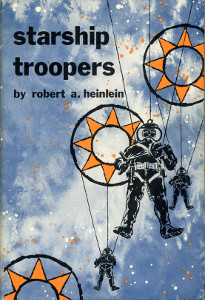Robert A. Heinlein’s
Starship Troopers

So. That was Starship Troopers; and that is what all the fuss has been about. Now I can see why controversy has followed this science-fiction novel for so long.
Is it fascist? Yes, I guess it is to a degree; but it argues its case quite well.
Is it a celebration of the army and all things militaristic? Oh, most definitely. But even for someone like myself, who simply hates orders of any kind, Heinlein explains why he does revere that culture very well. He is sincere. Although you may not agree with him, he is sincere.
I seem to hear of way too many funerals lately, even among those who are younger than me. And so, with far less years behind me than in front, it was time to check out some of the ‘classics.’ A few months ago I read Dumas’ massive The Count of Monte Cristo, which was well worth the time invested; and for a while now Cervantes’ even more daunting Don Quixote has been staring down from the shelf, just daring me. But for the moment I thought I would go for a different (and shorter) kind of classic and since Starship Troopers appeared in the year of my birth, 1959, it seemed sort of appropriate.
To be honest, I knew of it primarily through Paul Verhoeven’s wonderful film adaptation. The book I expected to be a hoary old 50s ‘to Infinity and Beyond’ type of entertainment — and it is that. And yet it seems to have stayed persistently relevent. Perhaps that’s because it was appearing only a few years after Korea – which it references – and just before Vietnam. In fact, the characters almost exclusively refer to the 20th century, even though it is set an implausible 4,000 or so years in the future. I say implausible, because apart from conquering the stars, nothing much seems to have changed.
The story, such as there is, begins with a fast and furious chapter in which we follow Johnny Rico and his fellow army-heads as they let loose on an alien enemy while garbed in almost indestructible battle-suits that are bristling with weapons; yes, right up to the atomic level and which lets them do everything except fly – and even that they can achieve in a limited manner. One loving description of these things and I don’t care how much of a pacifist you claim to be – you’ll be asking for a battle-suit come Christmas.
After that, almost half the novel (220 pages) concerns Rico at boot camp and is rather reminiscent of the first third of Kubrick’s Full Metal Jacket. It could easily read as a straight army tale, as the S.F. elements are minimal. With men having their personalities stripped from them and replaced with something that better pleases the military, it’s really nothing we haven’t encountered before. The surprise for me is the subtlety with which Heinlein shows Johnny’s transformation from a normally self-centred guy who has joined up on a whim to a man who is passionately committed to the whole military ideal, where votes are only allowed to those who have done army training and only those with definite abilities are permitted to contribute to society.
At least that’s the way it came across to me. It’s probably debatable as it sometimes seemed a little vague and the arguments heavily loaded. I was surprised initially that flogging occurs as a matter of course, given how far into the future this is – there are several lashes for drunken driving, for instance. Yet as Heinlein argues it, he’s not saying anything about the disciplining of people that I haven’t said myself at times. I still can’t understand how a teacher is expected to control a class of the current crop of juvenile delinquent shitheads that I see around me, without at least the threat of corporal punishment.
And yeah, yeah: ‘Tweren’t like this when I were a lad. We expected to be beaten to a bloody pulp and were happy to have it!”
No. Of course, I’m not advocating that at all – but I don’t honestly see how a teacher could have quieted some of us without the strap.
Not that I’m a fascist or anything… Anyway, most of the arguments take place in classroom flashbacks where teenagers learn ‘History and Moral Philosophy’ – which, as it happens, can only be taught by army veterans. Are you seeing a pattern here?
The debates were my favourite sections of Starship Troopers and I found them fascinating. I was less interested when the actual fighting began because it feels like it’s just slotted in since there supposedly had to be action at some point.
The Bug War is fought against an arachnid-hive-mentality-type species and gives Heinlein an opportunity to blast off a few missiles against Communism; but I had to rely on memories of Verhoeven’s more graphic film version for what they looked like, as I was never that clear (or interested) concerning these big spiders.
I liked this book, without being set on fire with it; well, I didn’t have a mad urge to rush off and sign up in order to meet my death slightly earlier in Iraq or some such hellhole. But…for the young man reading this in 1959, I can see why it just might have had that effect. Hopefully, we know a little bit more these days of the reality of war. But I’m not surprised to learn, reading up on it now that I’ve closed the last page, that even after more than half a century it is the first science-fiction novel to be on the reading lists of three out of the five U.S. military branches. No, that doesn’t surprise me at all.
Starship Troopers by Robert A. Heinlein was the winner of the 1960 Hugo Award.



Recent Comments